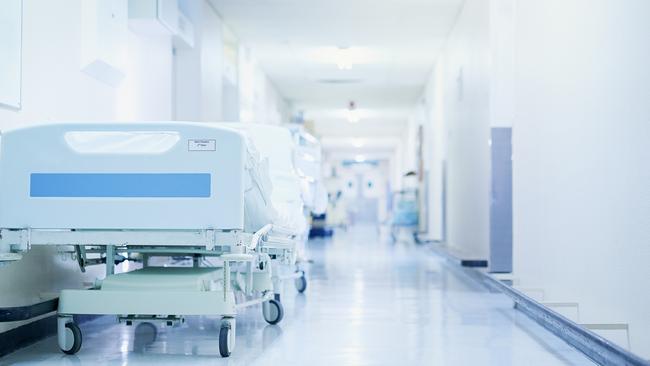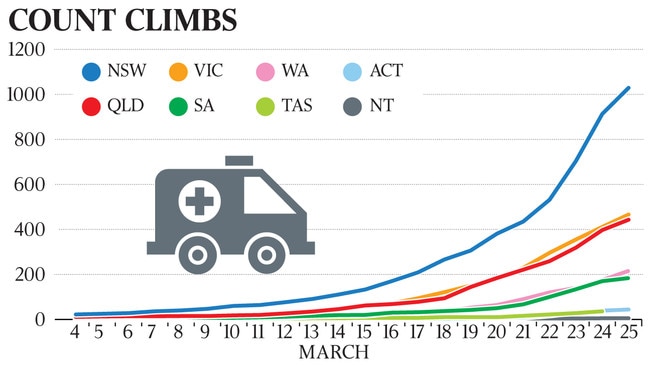Coronavirus: Non-urgent elective surgeries halted for virus barrage
Thousands of hospital beds have been freed up to cope with an anticipated wave of coronavirus patients falling seriously ill.

Scott Morrison has moved to free up thousands of hospital beds around the nation to cope with an anticipated wave of coronavirus patients falling seriously ill and needing urgent treatment as the COVID-19 pandemic heads towards its peak over the next few months.
The Prime Minister won agreement from the states on Wednesday to cancel all elective surgery in public and private hospitals until further notice, creating huge added potential capacity based on the current 2.2 million admissions a year for elective procedures — 66 per cent of which go through the private system.
The dramatic step is expected to allow public hospitals to handle cases of COVID-19 patients by sending them to newly created infection units, converted from general wards to handle only coronavirus cases.

The most seriously ill will go to expanded intensive care units that are divided from existing facilities devoted to surgery recovery and life-threatening illness.
Under the plan, large numbers of less serious cases of coronavirus could be transferred from public to private hospitals.
Public hospitals are moving to enter into contracts with private hospitals to buy ward space and ICU capacity to care for COVID-19 patients, and for other patients in hospital for other reasons. The suspension of elective surgery will mean that in the space of the next six months, more than 700,000 beds will be available in private hospitals to cope with the overflow from the public system.
The federal government is also negotiating with a number of hotels to take hospital patients who are recovering but not ready to be discharged to their homes.
The hospital capacity boost came as the number of coronavirus cases across Australia reached 2396, with NSW again experiencing the biggest surge to 1029, accounting for almost half of the nation’s infection tally, in part because of COVID-19 cases from the Ruby Princess cruise ship where passengers were allowed into the general community.
Victoria recorded the next-highest tally with 466, followed by Queensland with 443, South Australia 197, Western Australia 175, Tasmania 36, ACT 14 and Northern Territory 6.
The national cabinet decision to cancel elective procedures means the only surgery permissible for six months or longer will be cases where it is needed for patients in 30 days when their health would be at risk of an emergency without treatment. Only exceptional cases of lower-priority surgery needed in 90 days will go ahead, at a cost of leaving many with pain and disabilities to fend for themselves indefinitely.
In recent weeks, many hospitals around the country have activated surge arrangements to try to clear elective surgery waiting lists in advance of the suspension of elective surgery.
Queensland Health Minister Steven Miles told The Australian he was confident the state’s hospitals and clinics would be able to cope with the expected surge in coronavirus cases. The plan was for the majority of coronavirus patients to recover at home, with the most acute treated in hospital.
“Our modelling suggests that current capacity will be exceeded in emergency for five weeks, in wards for 10 weeks and ICU for 20 weeks,’’ he said.
“But making all treatment space available, cohorting COVID patients, using all the available private sector capacity and some new build lifts the capacity above the line of the likely scenario.’
“Right now, because we delayed the spread so long, it has given hospitals the ability to surge up above the likely demand.’’
Theatres in hospitals around the country are now also being shut down and turned into ICU wards in preparation for the admission of COVID-19 critical patients.
AMA president Tony Bartone said community facilities were also being co-opted to free up space in hospitals. “In different jurisdictions and in different networks, there are a whole range of options and serious proposals that would be looked at in terms of utilising additional opportunities to increase the number of beds available and to ramp up capacity,” he said.
Dr Bartone said the suspension of elective surgery would make a significant difference to hospitals’ ability to cope with the influx of COVID-19 patients.
“There’s no doubt that where the cessation of elective surgery occurs, it’s going to free up significant capacity as we deal with the net demand on the system,” he said. “However, the system, we must remember, is stretched to the full already and COVID will put a pressure the likes of which we’ve never seen before.”
As the capacity of hospitals is ramped up, doctors are raising questions over whether there will be sufficient personal protective equipment available.
AMA (NSW) president Kean-Seng Lim said the issue was becoming urgent. “Supply of PPE and in particular the question mark over supply of PPE is causing a lot of anxiety among health practitioners at all levels,” he said.
In a sign of concern about patients denied treatment with the suspension of elective surgery, Australian Orthopaedic Association president Andrew Ellis said he supported the government’s decision but retaining “time-critical”, urgent essential elective surgery was a priority to prevent long-term disability.
Dr Ellis said examples included acute fractures and dislocations, major trauma surgery, spinal surgery and procedures for intractable, severe pain.
Another concern raised on Wednesday was the impact on other patients. It was alleged chemotherapy had stopped for some outpatients, while those on transplant waiting lists could face indefinite delays.
Despite the sudden boost to hospital resources, there were signs on Wednesday that the health system was already under severe strain.
Mr Morrison confirmed that the federal Health Department had ordered 300 million extra masks to meet expected demand, of which 30 million were expected to arrive in a fortnight.
Doctors and nurses in Queensland hospitals, however, have been told to ration hand sanitiser, masks, gloves and gowns because of shortages, with no clear timetable for the arrival of new stock.
Hospitals have asked them to use gloves and masks two or three times where possible, in treating lower-infection-risk cases.
Several ICU doctors and nurses from major hospitals told The Australian on condition of anonymity that they had grave doubts the system could handle demand if, as expected, they were flooded with up to 50,000 COVID-19 cases in coming months.
“We won’t cope — no hospital will,” one said. Another complaint was the health risk presented to patients and health professionals from COVID-19 infection, with crowded waiting rooms and un-policed relatives in wards. Some hospitals face internal calls to limit or even cancel visitors.
There are also heightened concerns in the hospital system about the safety of medical staff. At just one hospital in Victoria, Werribee Mercy in Melbourne’s southwest, four have tested positive to coronavirus and been forced into isolation.
Victorian Premier Daniel Andrews said he expected more healthcare workers would test positive, even though all hygiene and contact-tracing work would be done to protect the vulnerable, particularly patients.
In South Australia, the Marshall government has increased general hospital beds by moving to reopen two decommissioned hospitals within the next month and also has additional ventilators on order if required.
SA Deputy Chief Public Health Officer Evan Everest told The Australian SA currently had 325 ICU beds and 384 ventilators to be used for critical care of patients.
In Western Australia, there are 133 intensive care unit ventilators in public hospitals, with 101 more purchased recently and awaiting arrival.
Additional reporting: Rachel Baxendale, Victoria Laurie,
David Penberthy



To join the conversation, please log in. Don't have an account? Register
Join the conversation, you are commenting as Logout